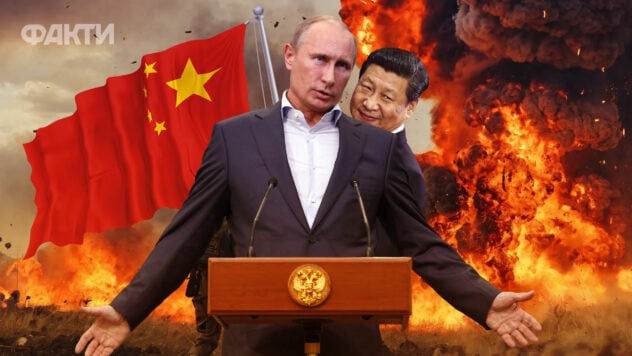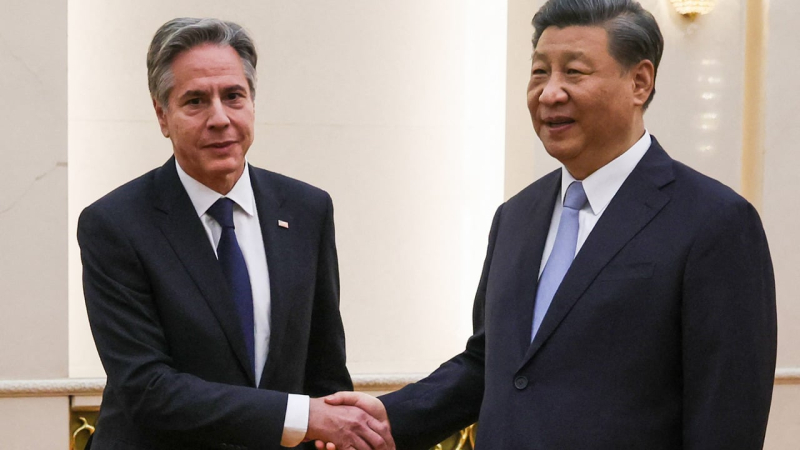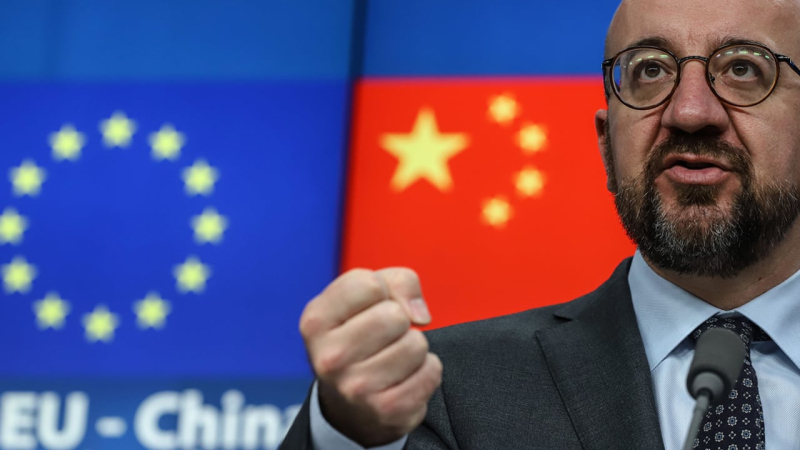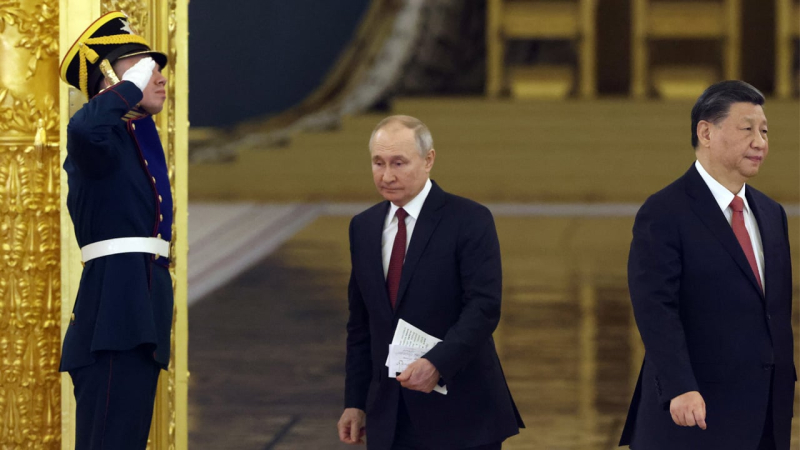
During the full-scale war, a record number of sanctions were imposed against Russia, mainly by Western countries, although there were extremely close trade ties between the Russian and European sides until February 24, 2022.
China, which is the second economy in the world, came to the aid of the aggressor state, in addition to countries such as Iran, North Korea or Belarus.
Moreover, China’s support for Russia’s aggressive war against Ukraine seems to be only growing, although some Chinese companies do not want to cooperate with the Russian Federation. Thus, US officials point to new Chinese supplies of dual-use goods, from which the Russians are making weapons to kill Ukrainians.
Now watching
About how China is helping Russia in the war against Ukraine and what the consequences may be — read on Facts ICTV.
The West is concerned about “partnership without restrictions”
Before the full-scale invasion of Ukraine, in February 2022, Russian dictator Vladimir Putin visited the Winter Olympics in Beijing, where, in a conversation with Chinese ruler Xi Jinping, the parties agreed on a “partnership without restrictions” ;.
After the meeting in March 2023, Putin and Xi promised to deepen economic cooperation.
Such Sino-Russian economic relations are of concern to the United States and a number of European countries. And it seems that relations between Beijing and Moscow have only deepened recently, as evidenced by statements from Washington.
So, on April 19, 2024, US Secretary of State Anthony Blinken stated that the PRC is providing the Russian Federation with critical elements for the production of weapons that Russia uses in war against Ukraine. In parallel with these statements, Blinken called on his foreign policy colleagues to increase pressure on Beijing on cooperation with Moscow.
— When it comes to the Russian defense-industrial complex, China is now making the main contribution to it. We see China sharing machine tools, semiconductors, and other dual-use goods that have helped Russia rebuild its military-industrial complex, — he said.
It is noteworthy that today, April 24, the chief US diplomat arrived in Shanghai on an official visit. In China, he plans to discuss, in particular, the issue of assistance to Russia, which the West wants to limit. Before his trip to China, Blinken said that he would insist that official Beijing weaken cooperation with Russia and prohibit its enterprises from re-equipping and replenishing the Russian defense industry.

Getty Images< /p>
Officially, China has never admitted that it supports one of the parties to the conflict, but at the same time, the Western press has repeatedly pointed out the increase in trade turnover at the customs of Russia and the Middle Kingdom, and, according to US officials, Chinese companies are transferring double technologies to the Russian Federation destination.
As an example, the State Department previously indicated that the United States is ready to take action against Chinese companies that harm the security of America and Europe. These statements are likely related to sanctions or other restrictions.
According to Reuters, in the United States there were previously discussions about the possibility of imposing sanctions against Chinese banks due to their support for Russia. This is evidenced by negotiations between US Treasury Secretary Janet Yellen and Chinese Vice Premier He Lifeng, where, as the Western press wrote, the American side warned of “significant consequences for companies from China” if they do not stop supporting Russian aggression against Ukraine. However, Reuters adds, the White House does not yet have a corresponding plan.
The United States is now refraining from sanctioning China's major banks because, as economic and political observers point out, this could significantly affect the global economy and relations between Beijing and Washington.
In a commentary to ICTV Facts, political scientist Alexey Yakubin explains that in response to help, Russia is actively selling its energy resources to China.
— That is, in fact, China, especially, I would say, until this year, played one of the key roles for Russia in terms of circumventing sanctions, because Russia bought a lot of truly dual-use goods, for example, industrial equipment, from China. But the situation that I see from the end of last year and the beginning of this year has changed somewhat, — he points out.
According to Yakubin, after the invasion of Ukraine, Russia had the expectation that China would be its key ally.
— But a separate question is to what extent Russia, in principle, fits into China’s idea that it is an ally, and not just China taking advantage of the situation that has developed, &# 8212; he adds.
According to the political scientist, the United States has begun to quite actively hint to China that it should not continue its policy of support towards Russia, and that official Beijing has the ability, given the economic dependence of the Russian Federation on China, to put pressure on Moscow.
How China helps Russia
After the full-scale invasion of Ukraine in 2002, Russia closed information on trade turnover with China, so the only source from which one can understand at least some economic relations between the PRC and the Russian Federation remains Chinese customs.
For example, the WSJ previously wrote, based on Chinese customs documents, that Chinese state-owned defense enterprises are supplying navigation equipment, jamming technology and fighter parts to state-owned defense companies from Russia, which are under sanctions.
In addition, according to the Associated Press, China has recently sharply increased its sales to Russia of machine tools, microelectronics and other technologies, which Moscow, in turn, is using to produce missiles, tanks, aircraft and other weapons for use in the war against Ukraine.
Two senior White House officials told the AP that in 2023, about 90% of Russian microelectronics came from China, which Russia uses to make missiles, tanks and airplanes. Almost 70% of Russian machine tool imports, worth about $900 million in the last quarter of 2023, came from China.
Chinese and Russian enterprises are also working to jointly produce unmanned aerial vehicles in Russia, and Chinese companies are likely to provide Russia with nitrocellulose, which is used in ammunition production, officials said.
The list of companies from China that are involved in these transactions include Wuhan Global Sensor Technology Co., Wuhan Tongsheng Technology Co. Ltd. and Hikvision. It is these enterprises that provide optical components for use in Russian tanks and armored vehicles.
Two US officials also told the AP that the Kremlin has received military optics for use in tanks and armored vehicles made by the Chinese firm North China Research Institute of Electro-Optics, and that China is supplying Russia with UAV engines and turbojet engines for cruise missiles.
A third senior official named another manufacturer — IRay Technology Co. Ltd.
Beijing is also working with Russia to improve its satellite and other space capabilities for use in Ukraine, which officials say could increase the long-term threat Russia poses to all of Europe. Earlier, citing intelligence data, officials indicated that China was also providing Russia with imagery for its war against Ukraine.
In addition, the British Telegraph previously indicated that China is also providing Russia with helicopters and drones.
And according to Politico, arms supplies from China to Russia began in June 2022, in particular, assault rifles, parts for drones and body armor.
ICTV Facts was unable to independently confirm information about the use of these types of weapons or equipment by Russia on the battlefield in the war with Ukraine.
How military support is supplied
Most of these goods are subject to Western sanctions, so Beijing, if it supplies these goods to Moscow, does so with extreme caution.
To bypass direct trade with Russia, China is using Central Asian trade routes, according to the WSJ.
According to the newspaper, these “trade arteries” run through Kazakhstan and Kyrgyzstan. These, as the WSJ writes, are one of many routes to Russia for so-called dual-use goods.
In addition, according to the publication, goods are coming to Russia from China that are produced on Chinese territory by large American enterprises. US companies claim that such deliveries occur without their permission.
— The Central Asian trade route is particularly important because it brings a large amount of Western-made goods into Russia. It is a key route for microelectronics, auto parts, luxury goods — goods that are used both on the battlefield in Ukraine and for personal consumption, — previously spoken Natalie Simpson, Russia analyst at C4ADS, a Washington, D.C.-based nonprofit research firm specializing in national security issues.
The fact that trade with Russia uses a route through the countries of Central Asia is also indicated by the fact that China’s exports of dual-use goods to Kazakhstan and Kyrgyzstan have increased sharply since February 2022, as evidenced by Chinese customs.
But these states are not the only source of supplies for Russia from China. To circumvent sanctions and indirectly sell goods to a terrorist state, China also uses the services of the United Arab Emirates and Turkey.
— Chinese companies transporting their products can take advantage of the direct route across the border, but those transporting Western goods often seek an additional degree of obfuscation. They can find it in Central Asia, — says Simpson.
UAVs, which are not included in the list of sanctioned goods, have become the most important tool of war. Two years before the start of the war, China did not report exporting a single drone to Kazakhstan.
But in 2023, Kazakhstan bought $5.9 million worth of drones from China and exported them to Russia for $2.7 million, according to Kazakh-Chinese trade data. Kazakhstan is not a major manufacturer of drones.
The West is trying to distract Beijing from Moscow
It is noteworthy that not only the United States, but also Europe's largest economy is moving in an attempt to weaken cooperation between Russia and China — Germany.
So, in April 2024, German Chancellor Olaf Scholz visited a number of Chinese cities, where, in particular, he met with Chinese leader Xi Jinping and Prime Minister Li Qiang.
During his business trip, Scholz discussed not only doing business with China and the economic partnership between the two states, but also touched upon the topic of Xi’s influence on the Russian dictator Vladimir Putin.

Photo: Getty Images
According to political scientist Yakubin, Western countries have several levers of influence on China, but Beijing itself also has something to respond to the democratic countries of Europe or the United States.
Yakubin adds that now the context between the countries is quite tense, given that the US Congress has allocated funds to help Taiwan, which will play a role for the PRC, and also that the US has intentions to finally ban the TikTok application , unless Beijing sells its stake in the company that runs this social network.
— In fact, Blinken's visit is taking place in China now under these conditions. And from what I see, the West is actively trying to win China over to its side. That is, to make sure that China does not continue to help Russia, so to speak, bypass sanctions. So that Russia cannot take advantage of the Chinese economic system, financial system, etc., — he explains.
Therefore, the expert points out, a separate question remains what official Beijing will choose in building its relations: a lonely and supportive Russia to China, or a powerful economic partner in the form of Western democracies.
— It seems to me that here Beijing has come to a certain crossroads. That is, it is unlikely that he will be able to continue as it has been since 2022, — adds Yakubin.
According to the political scientist, the future situation, including the Russian-Ukrainian war, will largely depend on what Beijing chooses.
— Will China be ready, for example, to limit trade turnover with Russia, due to the fact that it actually makes money from it? Limit it under the threat of Western sanctions…. The States have now reached such a state that, provided that China shows that it is ignoring this position, then it is possible that we will then see the first sanctions against Chinese companies , — he thinks.
In addition, the expert recalls, the European Union has already imposed sanctions against individual Chinese companies.
China's interests and response to possible sanctions
According to the political scientist, China maintains a tendency to move towards economic globalization, therefore the Celestial Empire is not interested in the world being divided into economic zones of influence.
— China is interested in ensuring that the model of economic globalization that became dominant in the 1980s continues. With the free trade regime, with the organization of world trade and so on. Here is one of the levers (of the West, — Red.), with which, it seems to me, we can talk about China, — he says.
The political scientist adds that Moscow’s optics in its view of China is that the Kremlin for some reason believes that the PRC has plans for global dominance in the world, for example, spreading its model in the world, as was the case in USSR.
— In fact, we see that China has no such plans. They are interested in their own economic growth, but they are not expansionist when it comes to their political model. That is, the economy — yes, they are ready to open their own enterprises and so on. But economics is not followed by the export of a political model, — he explains.
In turn, Beijing’s response to possible sanctions may be much more serious, although since the coronavirus pandemic a number of Western companies have begun to transfer their logistics routes from China, the political scientist notes.
— If the West introduced the first large-scale sanctions against China, the world economy would definitely feel a shock. Significant, in fact. I think that this understanding also exists in the West, because many things are interconnected, — he says.
More specifically, in response to sanctions, China may begin to threaten to directly send weapons to Russia, or, Yakubin adds, to touch on such a sensitive issue for the West as nuclear weapons.
— For the United States, for example, the issue of nuclear safety is very sensitive. And I do not rule out that Xi Jinping may then… I’ll just remind you that immediately after the start of the full-scale Russian invasion of Ukraine, China was everywhere on public platforms, there was the G20, it said everywhere that the use of nuclear weapons is a limit that China does not support. That is, I do not rule out that China may begin to hint to the West that “if so, then we will reconsider our position on topics that are sensitive to you”, — political scientist indicates.
Russia without China
Despite increased trade between China and Russia, which stands at $240 billion for 2023 (an increase of 26.3% in one year), the Financial Times points out that there is a “more nuanced picture”.
— First, look to see if trade between Russia and China is unusually high. Russia's nominal GDP is between Brazil and Australia. It turns out that the trade turnover of Russia, Brazil and Australia with China is approximately equivalent. This is not enough to conclude that such ties between Russia and China are nothing special, but it does at least suggest that the rhetoric about a special relationship between the two countries is on shaky grounds, — says the article.
In addition, China's imports from Russia grew by 12.7% in 2023, the FT writes, but such high growth rates “are not something unusual” in Chinese trade statistics. For example, Chinese imports from Canada grew by 39% in 2022, “but few observers suggest that Beijing is establishing special ties with Ottawa”, the material adds.
— It may be more instructive to look at the level of Chinese imports from Russia if we want to find out whether Chinese firms are disproportionately dependent on Russian goods and raw materials. The Kremlin may not like the picture: Russia remains a small supplier for Chinese business. Last year, Chinese imports from Russian firms amounted to $129 billion, only 5% of the total, — writes the publication.
In addition, increasing exports to China could be a double-edged sword: Russian commodity companies are increasingly dependent on China as an export market, which gives Beijing leverage over Moscow.

Photo: Getty Images
Therefore, the publication notes, instead of developing, trade ties between Russia and China may be catching up to an abnormally low base. Trade between the two countries was underdeveloped before Russia's invasion of Ukraine in February 2022, and now that sanctions have cut Russia off from Europe, Moscow has no choice but to turn to Beijing, thus stimulating catch-up growth.
— If the theory of catch-up growth is correct, then Russian-Chinese trade may soon reach a plateau, — writes the newspaper.
In parallel, in March, Chinese banks stopped servicing IT equipment sales to Russia, likely halting the growth of Beijing's exports to Moscow, since IT equipment makes up the bulk of Chinese exports to Russia.< /p>
— That Chinese financial institutions are increasingly wary of doing business with Russian companies reflects growing concerns in China about the risk of being subject to secondary US sanctions, — writes FT.
Therefore, the sky-high growth rates of trade between Russia and China may soon become a thing of the past, the publication writes.
Political scientist Yakubin adds that, in general, in Russia a lot is now very much tied to the high-tech sector of the People's Republic of China: various spare parts, industrial machines, parts and the like.
— If we imagine that China takes such a position (limiting trade with the Russian Federation, — Ed.), then this is a loss of colossal income that Russia receives, for example, from raw materials. This will be very noticeable for Russia, — the expert summarizes.

